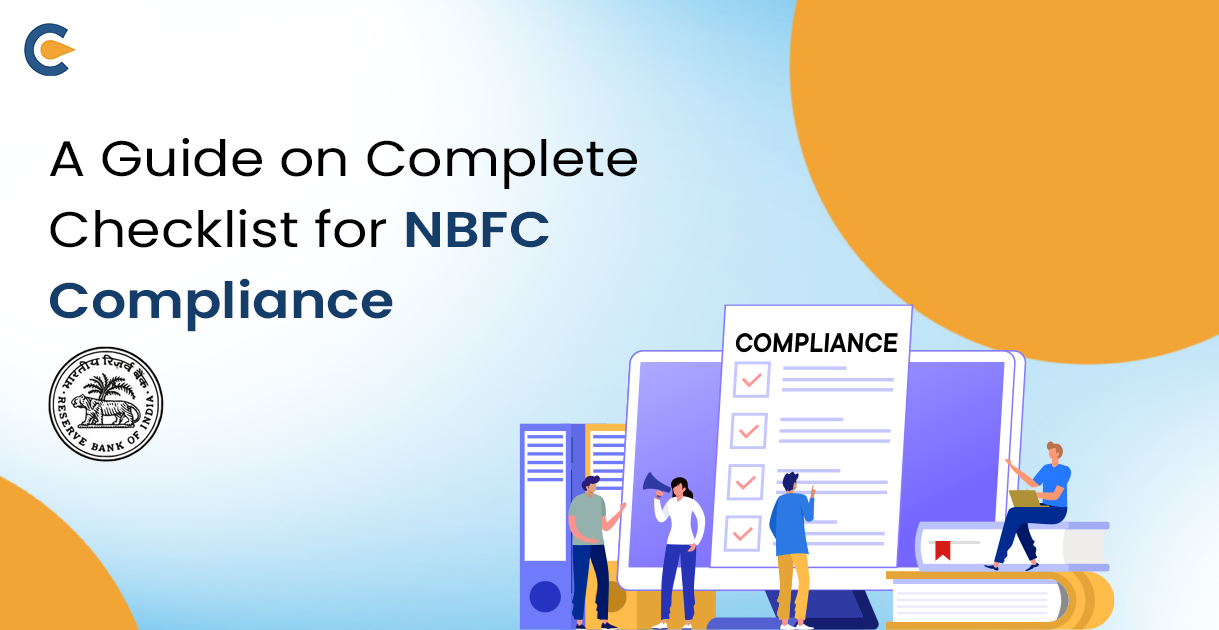Non-banking financial companies are a very important organ of India’s Public Financial Credit System. As they offer a range of financial services and products to both consumers and businesses, non-banking financial companies, or NBFCs, are essential to the financial ecosystem. However, in order to preserve financial stability, safeguard investors, and reduce systemic risks, an NBFC must strictly follow the checklist for NBFC compliance. Checklists for NBFC Compliances are exhaustive and need to be carefully followed in order to help them traverse the intricate web of rules in order to maintain compliance. Order to comply with regulations and continue operating a stable and profitable financial business in this blog.
A Non-Banking Financial Company (NBFC) is a business entity that is registered under the Companies Act, 1956 or Companies Act,2013 and is involved in the banking and credit-lending activities, such as lending and advances, purchasing shares, stocks, bonds, debentures, or other marketable securities issued by the government or local authority; leasing; hire-purchase; insurance; and chit business. However, this definition excludes any institution whose primary business is engaged in agriculture, industry, the sale or purchase of any goods (other than securities), providing any services, or selling, purchasing, or building of real estate. A non-banking financial company (Residuary non-banking company) is any corporation whose primary activity is accepting deposits under any scheme or arrangement, either in one lump sum – payment or in instalments through contributions or in any other way.
Understanding NBFC Compliance in India
NBFC Compliances in India revolve around overall compliance and legal requirements that banking companies are required to fulfil in order to carry out financial operations in India. For the purpose of running banking operations in India, NBFCS are required to adhere to the regulations and guidelines specified by the Reserve Bank of India. In order to set up an NBFC, the company must maintain a minimum corpus of net-owned funds (NOF) in order to obtain a Certificate of Registration (COR) along with other authorizations from the regulatory authorities.
Legal obligations for financial institutions in India are essential. Creating a checklist for NBFC Compliances is a very prudent exercise before going for an NBFC incorporation since it cancels out any possibility of non-compliance, both before and after the incorporation, that can damage the reputation of the company and even lead to legal implications such as revocation or cancellation of NBFC license.
Essential Requirements for NBFC Compliances in India
Similar to banks and financial institutions, NBFCs are regulated entities under the Companies Act of 2013 and the RBI guidelines. The RBI has released several master directors from time to time, which mandates that NBFCs should file various returns and records with the RBI about their deposit acceptance, Anti-money laundering, prudential norms compliance, and so forth. These master directives are the cornerstone of RBI-compliant and secure NBFC operations, and as such, they should be carefully reviewed to prevent severe penalties. With the number of NBFCs increasing in India, there has been a revamped view of the government with regard to several parameters related to the checklist for NBFC compliance in India. The most important aspects which are essential requirements for NBFC compliance 2024 are –
1. Registration and Licensing
Registration of an NBFC with the RBI is essential as it indicates that the company is compliant with the legal and banking requirements as per the RBI guidelines and the Companies Act. The RBI issues a Certificate of Registration (COR) to the entity desirous of operating as a Non-Banking Financial Company. This certification not only highlights compliance with the statutory framework but also induces credibility and reputation in the eyes of the market stakeholders and investors.
2. Protection of Data
NBFCs are engaged in the transfer and processing of large volumes of sensitive data such as financial details, personal details, and price-sensitive data. The Personal Data Protection Bill, 2023, IT Act,2000, and various RBI Master circulars have made it mandatory for NVFCs to put in place adequate security measures to protect and safeguard their customers’ sensitive data.
3. Adequate capital Recruitment
The Companies Act, 2013 mandates that in order to satisfy the checklist for NBFC compliance in India, the company shall have a minimum paid-up share capital of Rs. 2 crores. The capital requirement has been put in place to ensure that the company has enough assets to absorb any kind of financial losses or discrepancies that might affect investor money.
4. KYC and Anti-Money Laundering
Money laundering and financial fraud are big issues in front of the government. Hence, it is important that the NBFCs put adequate Know Your Customer (KYC) and anti-money laundering controls and protocols in place. Keeping proper records and reporting suspicious and fraudulent activities are very important aspects of the checklist for NBFC compliance.
Checklist for NBFC Compliance: NBFC Annual Compliance Based on Principle Business
Identifying the principal business is very important compliance for NBFCs in India’s Financial activity. As per the criteria of RBI laid down in 1999, a company is recognized as an NBFC from the outlook of its financial statement and audited balance sheets, principal business when a company’s financial assets must include more than 50 per cent of the income from financial assets and total assets constitutes more than 50 per cent of the gross income. Furthermore, a company must carry out activities listed under Section 45 I (c) of the Companies Act, 2013. If a company fulfils both these criteria and the checklist for NBFC compliance, it will be registered as NBFC by RBI. The term ‘principal business’, however, is not defined by the Reserve Bank of India or any other regulatory authority.
Types of NBFCs based on Activity and Liability
Based on the activity, liability, and the sector served, NBFCs can be divided into several categories. The Checklist for NBFC Compliance 2024 for all types of these companies are different, such as –
1. Asset Finance Company
An Asset Finance Company is an NBFC with a principal business of giving loans for physical assets as well as commodities to help support new and growing economic activity. For example, if you are an automobile manufacturer or distributor interested in financing tractors, motorcycles, buses, trains, etc., you can do it by forming an Asset Finance Company.
2. Deposit-Taking NBFCs
They are companies that accept deposits from the public. These companies are allowed to accept deposits from the public up to the amount of Rs. 25 lakhs. There are other companies as well-known as Microfinance Institutions that lend short-term deposits to low-income groups and households in the country.
3. Investment Companies
These types of companies are incorporated with the purpose of promoting entrepreneurship and pushing small-scale businesses in India. The credit provided by these companies is meant for the acquisition of securities or assets such as machinery, transport, vehicle or property. These companies are most useful for setting up Private Equity or Venture Capital Funds or investment companies.
4. Loan Companies
These include NBFCs that specialize in loan distribution, with the exception of financing assets, which are known as loan finance companies. It is advised to use a loan firm to provide secured or unsecured loans to individuals.
5. Infrastructure Finance Companies
These NBFCs lend finance for the purpose of providing long-term credit for infrastructure projects such as roads, bridges, highways, dams, power plants, etc. These companies, which are involved in the principal business of Infrastructure Development, shall satisfy the following conditions as part of NBFC Compliance in India –
- The NBFC should deploy at least 75 per cent of total assets in infrastructure loans.
- The NBFC should have a minimum net owned fund of ₹ 300 Crore
- The NBFC Should have a credit rating of ‘A’ and a CRAR of 15%
Checklist for Compliances in India
The checklist for NBFC Compliance and the NBFC Annual Compliance includes making several disclosures and reporting requirements to the regulatory authorities on a periodic basis. Failure or delay in these periodic compliances can lead to severe penalties for the company and even the suspension of the license or cancellation. The various monthly, quarterly and annual compliances to be followed by a company, based on its nature of financial activity, are –
1. Deposit-taking NBFCs
NBS-1
This return is required to be filed quarterly by the company, disclosing details such as financial details, audited accounts, balance sheets, etc.
NBS-2
This return details the prudential norms that are required to be submitted by the NBFC on a quarterly basis.
NBS-3
It is a quarterly return which is required to be filed highlighting the state of liquid investment made by the company.
NBS-4
It is the Annual Return which is required to be filed by NBFCs that hold public deposits.
NBS-6
If the money return that has to be filed by the company having turnover of more than Rs. 100 crore or more on exposure to the capital market.
ALM Return
This return has to be filed annually by NBFC holding public deposits of more than ₹ 20 crores or asset size of more than ₹ 100 crores, along with an audited balance sheet and Auditor’s Report.
2. Non-deposit-taking NBFCs
NBS-7
It is the quarterly return statement providing information related to capital funds, risk-asset ratios and assessments, and weighted averages.
NBS-2
It isthe monthly return on Important financial parameters of the NBFCs.
AML Returns
The Anti-money laundering returns should include the following details –
Monthly statements of short-term dynamic liquidity (Form NBS-ALM-1)
A half-yearly statement highlighting structural liquidity (From NBS-ALM-2)
Half-yearly statement of interest rate sensitivity (from NBS-ALM -2)
3. General Compliances
FIU -IND Registration
The checklist for NBFC Compliances requires the NBFC to register with the Financial Intelligence Unit of the Ministry of Finance. This registration is necessary to help the government combat money laundering activities under PMLA,2005.
CERSAI
It stands for Central Registry of Securitisation Asset Reconstruction and Security Interest of India. It is a central authority set up to monitor fraudulent transactions against equitable mortgages, and an NBFC must register with the CERSAI.
Central KYC
Every Regulated entity must have a valid Know Your Customer (KYC) Registration with the central repository to ensure a smooth exchange of information about the investors or borrowers/lenders of the NBFCs with the regulatory authorities.
Conclusion
In order to make sure that the checklist for NBFC compliance is followed and that the NBFCs operate responsibly, the RBI has released comprehensive regulations on deposit acceptance. The Checklist for NBFC Companies in India covers a wide array of compliances, measures, registrations, and clearances.
These regulations cover a range of topics, such as the maximum amount of deposits that can be collected, the requirement for a credit rating, the requirement to maintain liquid assets for repayment to depositors, how the deposit books are maintained, and prudential guidelines like maintaining sufficient capital, limiting exposure, and inspecting NBFCs. If the Bank observes through its inspection or audit of any NBFC or through complaints or through market intelligence that a certain NBFC is not complying with RBI directions, it may prohibit the NBFC from carrying out its financial activities or even cancel the NBFC license.
Frequently Asked Questions (FAQs)
What is a Non-Banking Financial Company?
Non-Banking Financial Companies, or NBFCs, are financial institutions that receive deposits, loans, advances, and marketable securities issued by local or government authorities. These institutions are incorporated and regulated by the provisions of the Companies Act, 2013.
What are NBFC Compliances?
NBFC Compliances in India revolve around overall compliance and legal requirements that banking companies are required to fulfil in order to carry out financial operations in India.
How are NBFCs governed in India?
Non-banking financial Companies in India are incorporated as companies under the Companies Act, 2013.
Based on Layers, how many NBCS classifications are there?
After a recent notification of the RBI 2022, NBFCS in India is divided into three categories based on their financial capabilities: slow-layer, mid-layer, and upper-layer NBFCs.
What are the compliance requirements for NBFC?
In the Indian financial sector, non-banking financial organizations, or NBFCs, are essential. They offer both individuals and companies a variety of financial services and goods, including investment management, insurance, and loans. NBFCs must, however, abide by a number of regulatory and compliance standards in order to do their business.
What is the checklist for due diligence of NBFC?
The checklist for NBFC Compliances in India revolves around overall compliance and legal requirements that banking companies are required to fulfil in order to carry out financial operations in India. NBFC compliances. For the purpose of running banking operations in India, NBFCS are required to adhere to the regulations and guidelines specified by the Reserve Bank of India.
What are the mandatory policies for NBFC?
As part of the checklist for NBFC Compliances in India, NBFCs are required to have several regulatory policies in place, such as Information Technology (IT) policy, KYC Policy, Fair Practice Code (FPC), FIU-IND and CERSI Registrations and Policies.
What is the risk compliance of NBFC?
Risk Compliance risk should be implemented by the Non-Banking Financial Companyas part of its entire compliance function. A process like this should guarantee that evaluations are conducted for every business segment, product (like digital loans, SME loans, etc.), and support function (like the information technology department, human resources, etc.) of the organization.
What is the KYC policy of NBFC?
As part of the checklist for NBFC compliances, every Regulated entity must have a valid Know Your Customer (KYC) Registration with the central repository to ensure a smooth exchange of information about the investors or borrowers/lenders of the NBFCs with the regulatory authorities. This is a mandatory compliance as per the PMLA, 2005.
How to audit NBFC?
The regulatory requirement with respect to auditmay change based on the NBFC's classification. Thus, it is critical that auditors comprehend the characteristics of the corporate environment. The auditor could use this to better plan and carry out audits in a productive way. For example, if an NBFC accepts public deposits, one of the audit's goals could be to verify that the NBFC is complying with regulatory obligations for the public deposits it has accepted.
Read Our Article: Minimum Capital Requirement For NBFC











